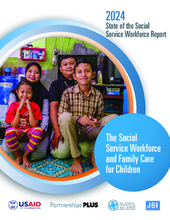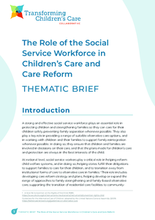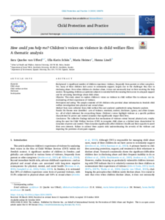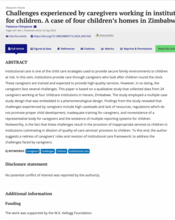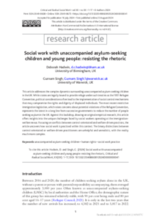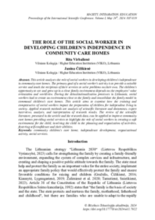Displaying 21 - 30 of 505
This year's report provides a snapshot of the key trends and promising initiatives shaping the social service workforce. It zeroes in on a particularly important issue: the critical role that the workforce plays in ensuring children can always benefit from safe and stable family care—whether that be in their own family or through family-based alternative care, when needed.
This thematic brief helps government policy and decision-makers understand the essential role of the social service workforce and how to strengthen that workforce in line with their national commitments to care reform and regional and global conventions. It includes high level guidance, recommendations and practical examples from diverse contexts for consideration when developing, supporting and strengthening the social service workforce.
Drawing from an Italian study conducted in residential care for children, the authors aim to investigate residential childcare educators' levels of compassion fatigue and work engagement, and to focus on the individual, work and organisational conditions associated.
The 2023 assessment of Diocesan Family Life Departments (FLDs) in Kenya, conducted by the Kenya Conference of Catholic Bishops (KCCB) in collaboration with Changing the Way We Care℠ (CTWWC), highlights the Church’s critical role in advancing care
This paper is based on a qualitative study that collected data from 24 caregivers working at four childcare institutions in Harare, Zimbabwe. Findings from the study revealed that challenges experienced by caregivers include high caseloads and lack of resources, regulations which do not promote proper child development, inadequate training for caregivers, and nonexistence of a representative body for caregivers and the existence of multiple reporting systems for children.
This article addresses the complex dynamics surrounding unaccompanied asylum-seeking children in the UK.
This article aims to examine how the training and competencies of social workers during the deinstitutionalization processes in Lithuania impacted the preparation of children for independent living in society. The review of the scientific literature, presented in the article and the research data, can be applied to improve community care homes providing social services to highlight the role of social workers in creating a safe environment for the child, involving the child in the planning and organization of activities, fostering self-confidence and their abilities.
Bringing together interdisciplinary scholarship, Mark Henrickson argues that it is essential to understand and critique social work’s origins in order to work out what to retain and what must change if we are to achieve the vision of a truly global profession.
Evidence suggests that providing out-of-home care to children is associated with high levels of compassion fatigue, possibly due to various work-related factors. This global systematic review examined the existing literature to determine the extent to which out of home care work results in compassion fatigue. To do so, it established which out of home care settings compassion fatigue has been measured in, how, and what factors contribute to developing compassion fatigue in this work.
On 7 February 2024, the Global Social Service Workforce Alliance hosted a webinar to showcase the findings from their recently released 2023 State of the Social Service Workforce Report: A Decade of Progress, A Future of Promise.

